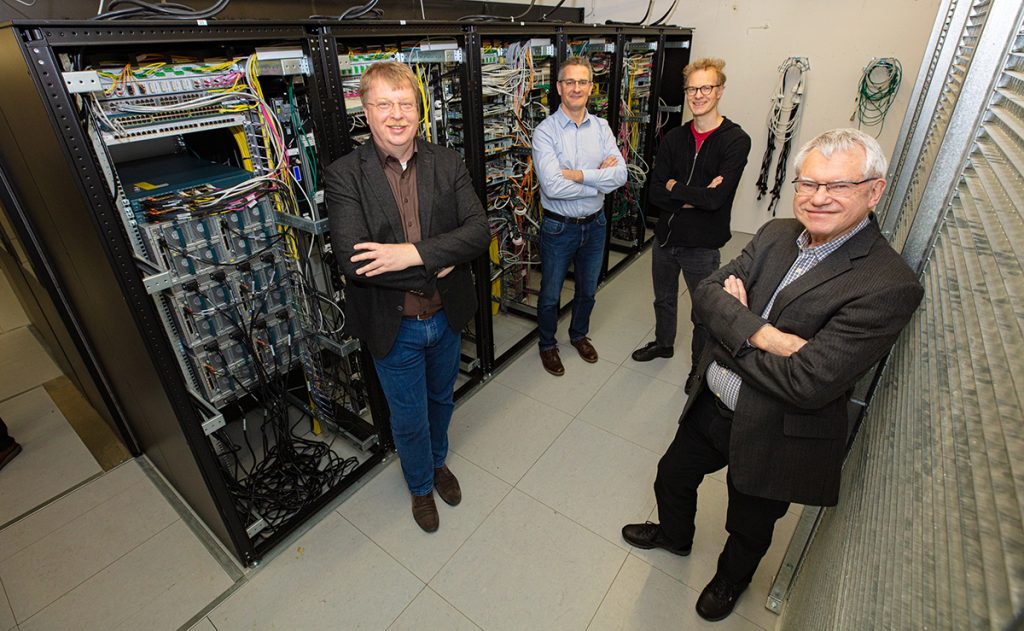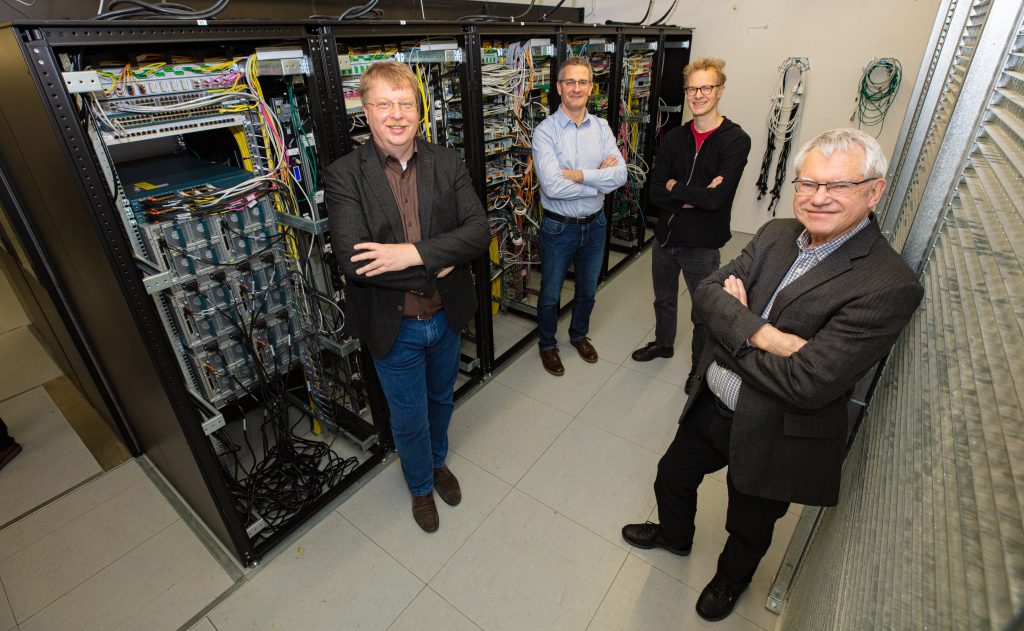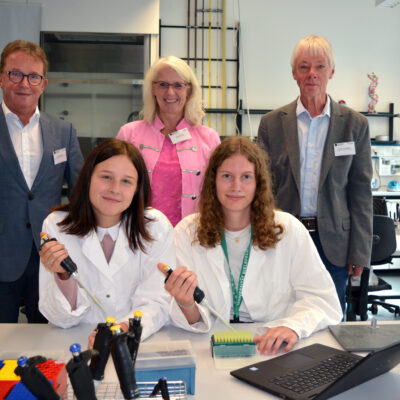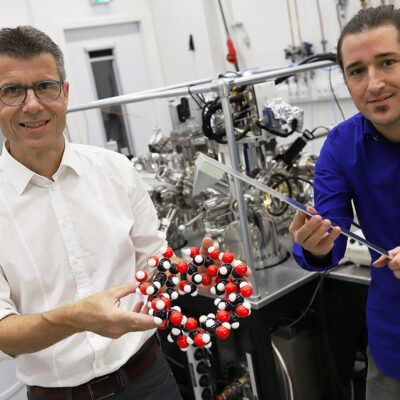Forscher*innen aus den Lebenswissenschaften sollen bundesweit auf leistungsstarke Technologien zur Analyse großer Datenmengen zugreifen können. Dafür hat das Bundesministerium für Bildung und Forschung (BMBF) rund 80 Millionen Euro in ein Großprojekt investiert – das Deutsche Netzwerk für Bioinformatik-Infrastruktur (de.NBI). Die Universität Bielefeld koordiniert das Projekt. Mit einem Festsymposium feiern Wissenschaftler*innen und Politiker*innen am Donnerstag, 13. Februar, in Berlin das fünfjährige Bestehen und die bisherigen Erfolge des Netzwerks: eine verteilte Cloud-Infrastruktur, bundesweit acht Servicezentren und 40 beteiligte Bioinformatik-Gruppen. Das BMBF hat jetzt die weitere Förderung von „de.NBI“ zugesagt. Bis Ende 2021 stehen allein der Universität Bielefeld bis zu 5,3 Millionen Euro zur Fortführung des Projekts zur Verfügung.
Die Geschäftsstelle von de.NBI (gesprochen: „Dennbi“) ist am Centrum für Biotechnologie (CeBiTec) der Universität Bielefeld angesiedelt. Sie hat bislang insgesamt 250 Wissenschaftler*innen zusammengebracht, die bundesweit für den Aufbau der Bioinformatik-Infrastruktur kooperieren. „Welche Fortschritte sie seit 2015 dabei erzielt haben, ist das Thema des Festsymposiums“, sagt de.NBI-Koordinator Professor Dr. Alfred Pühler.

Cloud für Forschende aus den Lebenswissenschaften
Das Netzwerk bietet Forschenden aus den Lebenswissenschaften eine IT-Infrastruktur an, mit der Daten über eine de.NBI-eigene Rechnerstruktur ausgewertet werden können. „Dafür sind wir einen innovativen Weg gegangen und haben an inzwischen sechs Standorten eine förderative Cloud eingerichtet“, sagt Professor Dr. Alexander Sczyrba, Leiter der Arbeitsgruppe Computational Metagenomics an der Technischen Fakultät der Universität Bielefeld. „Diese Cloud steht allen Forschenden aus den Lebenswissenschaften kostenlos zur Verfügung. Sie ist auf Deutschland beschränkt und stellt somit sicher, dass keine sensitiven Forschungsdaten ins Ausland gelangen.“ Mehr als 100 Bioinformatik-Programme zur Datenanalyse stehen den Forschenden aus den Lebenswissenschaften zur Verfügung.
Bundesweit acht Servicezentren eingerichtet
Doch die Rechnerleistung und Software alleine würde nicht ausreichen, um die bioinformatische Forschung zu unterstützen. „Entscheidend ist es, den Forscher*innen die Kompetenzen für den Umgang mit der Technik zu vermitteln und ihnen mit Dienstleistungen zur Seite zu stehen“, sagt Alfred Pühler. Dem Netzwerk sei es gelungen, bundesweit acht Servicezentren aufzubauen, an denen 40 Gruppen aus Bioinformatiker*innen ihre IT-Dienstleistungen, Beratungen und Fortbildungen anbieten.
Die Zentren sind thematisch unterschiedlich ausgerichtet und decken unter anderem die humane, pflanzliche und mikrobielle Bioinformatik ab. „In Bielefeld betreiben wir das Servicezentrum für mikrobielle Bioinformatik, das die bioinformatische Analyse aller molekularen Daten von Mikroorganismen, aber auch von mikrobiellen Gemeinschaften im Blick hat“, sagt Professor Dr. Jens Stoye, Leiter der Arbeitsgruppe für Genominformatik an der Technischen Fakultät. Von de.NBI profitiere auch die Forschung an der Universität Bielefeld, sagt Professor Dr. Martin Egelhaaf, Prorektor für Forschung und Forschungstransfer der Universität Bielefeld. „Unsere Wissenschaftler*innen können dank der Möglichkeiten des Netzwerks heute schneller und unkomplizierter bioinformatische Analysen vornehmen als bislang. Das gilt für unterschiedlichste Gebiete – von Biotechnologie bis Medizin“, so Egelhaaf.
„Herausragende Zentrum für Bioinformatik-Infrastruktur“
„Jedes Jahr organisiert das Netzwerk mehr als 80 Trainingskurse für den Umgang mit den Bioinformatik-Programmen. So konnten seit Beginn der Initiative mehr als 6.000 Wissenschaftler*innen geschult werden“, sagt Professor Dr. Andreas Tauch. Er ist Leiter der de.NBI-Geschäftsstelle, die die Dienstleistungen und Trainings des Netzwerks koordiniert und Nutzer*innen an die spezialisierten Servicezentren vermittelt.
„Die Universität Bielefeld hat sich zu einem herausragenden Zentrum für Bioinformatik-Infrastruktur in Deutschland entwickelt“, bilanziert Netzwerk-Koordinator Alfred Pühler. Er betont, dass de.NBI von seiner Ausrichtung her auf Dauer angelegt ist. „Die Wissenschaftler*innen aus den Lebenswissenschaften sind auf eine stabile, zentrale Infrastruktur angewiesen, um ihre riesigen Datenmengen zu verarbeiten und unkompliziert miteinander teilen zu können“, sagt Pühler. Aktuell werde an einer Lösung gearbeitet, um das Netzwerk zu verstetigen. „Das Bundesforschungsministerium hat die weitere Finanzierung des Netzwerks bis Ende 2021 zugesagt, um diesen Diskussionen mehr Zeit zu geben.“
It should be possible for researchers in the life sciences to draw on powerful technological services throughout Germany when they need to analyse large data sets. This is why the Federal Ministry of Education and Research (BMBF) invested about 80 million euros in a major large-scale project: the German Network for Bioinformatics Infrastructure (de.NBI). Bielefeld University is coordinating the project. On Thursday 13 February, scientists and politicians celebrated the fifth anniversary and the previous successes of the network with a symposium in Berlin. These successes include a distributed cloud infrastructure, eight service centres throughout the nation, and 40 participating bioinformatics groups. The BMBF has now announced continued funding for the de.NBI. Until the end of 2021, Bielefeld University alone will have up to 5.3 million euros at its disposal to continue the project.
The administration office of the de.NBI (pronounced ‘Dennbi’) is located at Bielefeld University’s Center for Biotechnology (CeBiTec). Up to now, it has brought together a total of 250 scientists who are cooperating in building up the bioinformatics infrastructure throughout Germany. ‘The progress they have made since 2015 is the topic of the symposium,’ says the de.NBI coordinator Professor Dr Alfred Pühler.

The network offers researchers in the life sciences an IT infrastructure that can be used to analyse data over de.NBI’s own computer network. ‘We took an innovative approach here and set up a national cloud at what are now six locations,’ says Professor Dr Alexander Sczyrba, head of the Computational Metagenomics research group at Bielefeld University’s Faculty of Technology. ‘This cloud is available free of charge to all researchers in the life sciences. It is restricted to Germany, thereby ensuring that no sensitive research data leave the country.’ More than 100 bioinformatics programs are available to researchers in the life sciences with which to analyse their data.
However, computing power and software alone would not be enough to support bioinformatics research. ‘What is decisive is to enable researchers to acquire the necessary competencies to handle the technology and to support them with services,’ says Alfred Pühler. The network has succeeded in setting up eight service centres throughout Germany in which 40 groups of bioinformatics experts offer their IT services, advice, and training courses.
The centres focus on different fields covering, among others, human, plant, and microbial bioinformatics. ‘Bielefeld runs the service centre for microbial bioinformatics focusing on the bioinformatic analysis of all molecular data on micro-organisms but also on microbial communities,’ says Professor Dr Jens Stoye, head of the Genome Informatics research group at the Faculty of Technology. Research at Bielefeld University also profits from the de.NBI according to Professor Dr Martin Egelhaaf, Bielefeld University’s Vice-rector for Research and Research Transfer. ‘Thanks to the possibilities provided by the network, our scientists can perform bioinformatic analyses more quickly and with fewer complications than before. That applies to the greatest variety of disciplines—from biotechnology to medicine,’ says Egelhaaf.
‘Each year, the network organizes more than 80 training courses on how to use the bioinformatics programs. This means that we have trained more than 6,000 scientists since the beginning of the initiative,’ says Professor Dr Andreas Tauch. He heads the de.NBI administration office that coordinates the network’s services and training courses and refers users to the specialized service centres.
‘Bielefeld University has become an outstanding centre for bioinformatics infrastructure in Germany,’ concludes the Network Coordinator Alfred Pühler. He emphasizes that the de.NBI is designed to become a permanent structure. ‘Scientists in the life sciences depend on having a stable central infrastructure so that they can process their enormous data sets and communicate them in uncomplicated ways,’ says Pühler. Currently, they are working on a way to make the network permanent. ‘The Federal Ministry of Education and Research (BMBF) has agreed to finance the network until the end of 2021 to give more time for these discussions.’
Further information:
Website of the German Network for Bioinformatics Infrastructure




